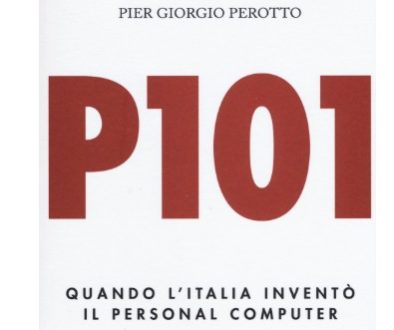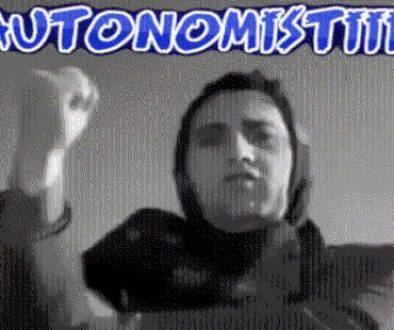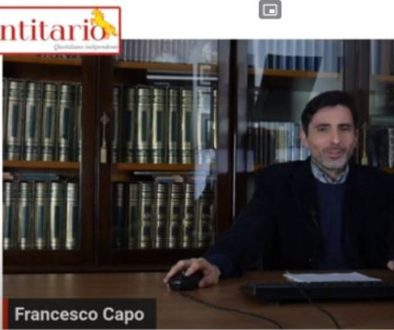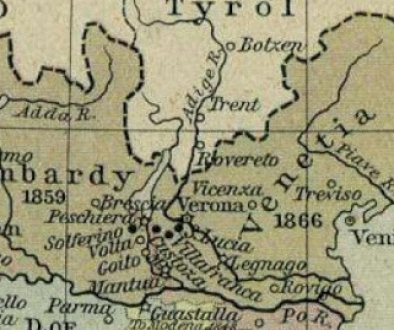Mocellin makes some assumptions to save the referendum, but do not work.
 I quickly comment on Alessandro Mocellin's pdf on the feasibility of the consultative referendum for the independence of Veneto (Veneto region), appeared here (but no longer available in November 2017)
I quickly comment on Alessandro Mocellin's pdf on the feasibility of the consultative referendum for the independence of Veneto (Veneto region), appeared here (but no longer available in November 2017)
But first I have to define an elementary concept, the concept of people.
Given that there is no international legal definition of a people (or nation) , there is a series of commonly adopted criteria, in particular the one developed by Conforti for the UN, so we can say that a people is identified by various factors, like language, history, the historical territory, in some cases religion…. distinctive criteria such as genetic ancestry can now rarely be used, because it inevitably ends up in racism, but it is a criterion still used for example in the classification and recognition of crimes of genocide.
Not all of these “characters” of a people are necessary for the definition and existence of a people.
For example, the Swiss are a people but do not have a single language. From this last aspect, that of plurilingualism, it is clear that not even language is a sufficient criterion on its own to define a people.
The United States of America calls itself a nation, and they have many races, religions, and several languages, and the concept of “nation” it is the same as people, in international law, not to be confused with that of “people” or population.
I leave aside the genetic and religious aspects of the United States and in general.
For international law, people and nation are the same thing, and is generally attributed to one “state” one sun “nation”, when this is not the case we speak, if recognized, of “national minorities”, however, it would be equally valid to define peoples without a state. So there are in many states “minorities” of the nation, which are not linguistic minorities, but they are “national minorities”, governed in the law of the Council of Europe by two different treaties.
Then let's look around. Who are the South Tyroleans ? I am a population of German origin who speak German, and in their territory they share sovereignty with the Italian population brought or arrived over the last few years 70 years. This is by virtue of some special agreements with Austria. Obviously we cannot define”South Tyroleans” recently settled immigrants who are legally resident, and Italians also have equal rights compared to natives, now being able to boast some rights compared to a century ago.
So let's ask ourselves: to a possible international referendum of South Tyroleans, who should be voted on ? Obviously the South Tyroleans themselves! And the others? Questionable, I think they should declare themselves Tyroleans to be eligible.
Implicit in what I say is the principle that sovereignty belongs to the original inhabitants of the territory. This is a concept also excepted by the laws on “indigenous peoples”. Anyone who denies these principles goes against human rights.
Yet, for example, when some Baltic states returned to sovereignty after Russian occupation they found themselves facing this same problem as new citizens of Russian origin . The government of Lithuania for example, it simply gave Russian immigrants the opportunity to change citizenship and declare themselves natives. However, many native Russians rejected this option, this too was their right (because it is now internationally prohibited to impose the “Nationality” to foreigners as did fascism in Albania, Abyssinia, Istria and Dalmatia etc.).
In the Baltic states the option was given, and those who did not opt simply did not acquire citizenship, hence the right to vote “national” and therefore did not vote in the Referendum.
On the other hand, why invading foreigners should be able to vote “in place” of the original citizens?
This is what Italy did in 1866 when he also had his soldiers vote in large numbers in the referendum, but in violation of international law.
If we look at other peoples, no one would dream of saying that the Kurds of Iraq are not Kurds while those of Turkey are, and viceversa.
Coming to the Venetians , incredibly they want to force the Venetians to divide, not according to the division determined by state lines (as in the Kurdish or Basque case) , but even of a simple administrative region!
For what reason the Venetians of the Friuli Venezia Giulia Region are not Venetians ? The Venetian (and Friulans) who are in that region have always been from the Veneto, they speak the Venetian or Friulian language and have the same history as the Venetians of the Veneto region.
The same goes for the Venetians who are in the territories of the Lombardy region in Trentino.
Simplifying, why Padua or Verona are Venetian and Bergamo and Brescia are not too, which belonged to the Venetian republic for about the same time ?
Because they exclude the citizens of Brescia and Northern Mantua from being Venetian ? Who has the right to exclude these Venetians from their right “national”.
The referendums confuse the elementary concept of the people, and define “Venetian” only those residing in the Veneto region, an artificial border created by the Italian state after the war due to the loss of the Venezia Giulia of Istria and Dalmatia. Nothing compared to the approx 2500 years that the lands of “Venice and Istria” they have in common !
Denying a people their history and their language is the first and most serious violation of their rights, and they are political choices made only by those who do not know history, or wants to delete it.
E’ this is what we want to achieve with the referendum.
Worse still. Just as it is illegal to declare those who are Venetian outside the border of the administrative region as non-Venetian, similarly it is illegal and racist to force residents of the Veneto region to declare themselves Venetian when they feel Italian, and they are, and they want to stay, also linguistically and culturally.
Returning to Mocellin, he confuses a people's right of self-determination (subject of international law) with the law of the Veneto Region: the region has no international right of self-determination at all, but only of administrative government (and vaguely autonomous as well).
It is therefore completely unfounded to invoke the right of self-determination by applying it to the region, something already clarified as unconstitutional by the Constitutional Court with the sentence 365 of the 2007 . The court made it clear that the region has no international representation of a people. Point. Insisting is just useless and a waste of time, as well as seriously damaging the right of the Venetians.
Furthermore, the region can only decide on its own matters, that it is law, settlement or termination.
It must be said that the Resolution is not a law, just a wish without legal validity. However, it is reprehensible if it is in contrast with the values ​​imposed by the Constitution.
On the other hand, the statute itself says it clearly “art. 19 – Legislative and regulatory autonomy.
1. The Regional Council exercises legislative power in compliance with the Constitution, of the constraints deriving from the European legal system and international obligations.”
It would be respectful of the Constitution to declare the sovereignty of Veneto ? Obviously not! So why look for an act of force that can lead to nothing except being placed under commissionership, also preventive (I'll explain later)
Let us ask ourselves if the region can seek the opinion of its residents with a consultative referendum . CAN HE ? It depends on the Statute and on the subjects.
The Statute of the Veneto Region allows consultative referendums only on matters of strict relevance (competence ) of the region, excluding everything else, including international matter. dice “art. 27 – Advisory referendum.
1. The Regional Council may decide to call consultative referendums of the populations concerned on measures or proposals for measures falling within the Council's competence [ .. ] in accordance with the regional law.”
I do not repeat what I have shown on TV and on my site in the last few days, and refer to the explanation here
Mocellin in his PDF continues taking it for granted that the administrative body “Veneto region” represent the people of Veneto, something denied even by its own statute which it says “The Region safeguards and promotes the historical identity of the people and civilization
veneta” which is a story that goes far beyond regional borders. Suffice it to say that the first Doge was from Grado (Today the province of Gorizia) and the last Doge was from Pordenone (always Veneto Region).
Not only , the region has no autonomy beyond the Constitution, as reiterated by art. 3 of the Statute “art. 3 – Autonomy of the Veneto Region and local authorities.
1. The autonomy of the Region is expressed in the exercise of legislative power, regulatory and administrative and in full implementation of the financial autonomy recognized by the Constitution.”
All the action of the Region must take place only in the matters within its competence, and in these orientate oneself to respect the laws according to the hierarchy of sources.
for the Constitution ” art. 117 [..] The state has exclusive legislation in the following matters:
A) foreign policy and international relations of the state; relations of the State with the European Union; right to asylum and legal status of citizens of states not belonging to the European Union;
I) citizenship, marital status and registry offices;”
that is, questions of international politics and independence are not matters of the Region, because they are reserved to the State . Point!
Or it is believed that the Constitution can be circumvented from within a regional body ?
The letter i) dell’art 117 reserves the definition of citizenship and registry to the State. So the region cannot define “Venetian” residents of the region, it would be a violation of competences, as well as the right of the Venetian people to define themselves in self-government.
Even in concurrent legislation the Constitution says that “In matters of concurrent legislation, power lies with the Regions
legislative, except for the determination of the fundamental principles, reserved for state legislation.”
Certainly the legislation of the State does not allow the Region to do its own thing, and framework standards, cut on the Constitution, they prevent any fantasy in the Region.
On the other hand, the Constitution establishes and imposes the values of “National unity”, “national interest”.
On the other hand, the fantasy that the region can declare itself a sovereign state and create borders is expressly prohibited by the art. 120 the Constitution:
” art. 120
The Region cannot establish import or export duties or transit duties between the Regions, nor adopt measures that hinder in any way the free movement of people and things between the Regions, nor limit the exercise of the right to work in any part of the national territory.”
Furthermore, it seems like we are reading the other half of the chain link which is the regional statute “art. 19 – Legislative and regulatory autonomy.
1. The Regional Council exercises legislative power in compliance with the Constitution, of the constraints deriving from the European legal system and international obligations.”
We continue to follow Mocellin who then advances into the hypothesis that the Regional Council “indicates” a referendum not with a law (easily criticized as he himself says), not with a regulation (which would be for things already defined beforehand by a law) but by an atypical act, type one “resolution”. So unfortunately it wouldn't be a law, but a wish.
However, it is the statute itself that denies this possibility by saying that “art. 25 – referendum.
1. Regional law regulates eligibility limits, the procedure, the implementation methods and effects of the referendum.”
That is, the region must make a regional law to call a referendum of the type advocated by Mocellin, but this law could not allow a referendum outside the cases provided for by the statute. We are at the level of confusion ?
Mocellin then continues with the hypothesis that the region can relate to the UN or the UN states , but this is denied by the constitution, art.17 , which reserves foreign policy to the state.
In short, it is necessary to accept what is evident to a scholar of constitutional law: the region is nothing more than a peripheral body of the State. Anyway, as mentioned, this was reaffirmed without imagination by sentence no. 365/2007 of the Constitutional Court .
Regarding the right of self-government of the Veneto people, Mocellin confusing the international law of a people like the Veneto again on page 3 (that goes from Bergamo to Udine at least), with the right of a peripheral body of the state such as the regional body.
This is absurd, if Mocellin's reasoning were correct it should be recognized that the Friuli Venezia Giulia Region could also declare a Veneto state ! And the poor Venetian people from Bergamo to Udine, he has no right to his integrity ? Of course he has it, it is imposed by international law !
Mocellin acknowledges that a referendum-poll like the one he himself hypothesized would not be a referendum, and it would not bind the region.
It follows that the act would not justify the region to any action contrary to the Constitution. But even if it were a referendum !
It should be remembered that the crime of attacking the Constitution, which carries a life sentence, it is a crime of intent, which takes the form of means and opportunities available in a project to change the constitutional order in ways not provided for by law.
The law and the Constitution absolutely do not provide that the Region can change its size or its legal status, and the Council or the Executive could be dissolved or placed under commissionership if only a unilateral declaration of sovereignty were decided upon. On the other hand, many of these antics have been done throughout the world. In Catalonia they have made them 16 and they are not served. The President of the Catalan Parliament has also recently declared that they are all illegal!
Who can change the Constitution is not the region.
It is useful to know that the International Court of Justice and the UN Assembly did not recognize sovereignty in Kosovo precisely because the declaration of sovereignty was made by employees of the Serbian state at the head of the Kosovo region.
That is, if Zaia declared sovereignty, or the Council, they would not be recognized internationally but certainly for arrest.
Yet the Veneto people for international law as per Law 881/1977, has the right to change the Constitution, this, however, only through its own self-government established for this purpose.
E’ only one entity “Self-Government of the Venetian People” to have this right , but only if made up of Venetians, which has its own self-determined bodies according to international law, and compatible with international law, that is, with the Government, parliament, judiciary, elections etc. . It goes without saying that the Veneto People are not just residents of the Veneto region, nor are all residents of Veneto Venetian. The Constitution of such a Self-Governing Body of the Veneto People compatible with international law is another matter, however, I refer to the website www.statoveneto.net
Mocellin concludes his “excavation” that a better referendum question would be “You want Veneto to exercise its sovereignty on the international level?”
Re-read the regional statute “art. 27 – Advisory referendum.
1. The Regional Council may decide to call consultative referendums of the populations concerned on measures or proposals for measures falling within the Council's competence [ .. ] in accordance with the regional law.”
The referendum proposed by Mocellin would be on international and foreign policy matters, that is, it is not competence (or matter) of the region because it is reserved for the state by the Constitution (see above).
Mocellin also proposes the question “Do you want international negotiations to begin with all states for the recognition of the self-government of the Veneto people?”.
I would like this question if it weren't for the fact that it is even more illegal.
According to the statute, the self-government of the Veneto People in an international sense is not a matter of competence of the Region, because the region has no foreign and international policy.
But this question would also be illegal under international law. In fact, what would happen if the residents who vote of Italian nationality managed to lose the referendum ? Such a referendum could deny the Venetian people their right to self-government and self-determination in the international sense ? Obviously not, it would be a violation of sovereign human rights, international and pre-constitutional. So it's not even a referendum, but a violation of human rights !
All these assumptions do not help to clarify the picture, Rather, they create unnecessary discussions .
All this unfortunately comes from the confusion between “people Venetian” E “residents of the Veneto region”, sown since 1998 with the resolution 42.
A logical definition of “people Venetian” which is legal under international law and at the same time recognizes the language, of the history and territory of the Venetian people. It is clear that its drafter did not know who the Venetians are or their history or did not take it into account, violating their right.
The definition of the characteristics of the Venetian people cannot be done by an entity other than the Venetian people, even if compatible with international law.
If we start from the fact that the residents in the territory from at least 3 generations are from the Veneto, then they are certainly Venetians entitled to self-determination, but in accordance with international law, that is, without excluding the other Venetians.
in 1999, through self-determination “autopoietica”, this self-government was created which safeguarded the right of all Venetians to self-government. Coherence between intentions and actions is fundamental for international recognition.
A president of an administrative region who declares sovereignty is by definition against coherence, as well as the Regional Council. Self-determination must not be confused (which is not a crime as the investigations into me have shown) with subversion, which is what those who have sworn loyalty to the state do. And this also applies to the regional council.
Past this “high” by referendum (which is just a fantasy), we will be able to discuss what the Regional Council and/or the council could do to make some of the rights of the Venetians to self-government effective, in synergy with the other regions of course.
Only the Self-Government of the Veneto People can achieve full sovereignty and international independence, and the sooner we understand this the better for all Venetians.
Updated 2023.
in 2013 Alessandro Mocellin expressed his opinion on the feasibility of the consultative referendum for the independence of Veneto (Veneto region), appeared here (but no longer available in November 2017).
However, the end of the story is that in 2015 the Constitutional Court declared it unconstitutional the request for a consultative referendum on the independence of Veneto, citing the same reasons I presented in the book The referendum that cannot be held.
The following is therefore a text from before those events, which retains its validity, but which is part of the discussions on the topic now overtaken by events.
First we need to define an elementary concept, the concept of people. In international law there is no precise definition of people, but there is a series of commonly adopted criteria, in particular those developed by Conforti for the UN, I believe it was in the preparatory works of Conforti's International Pact on Civil and Political Rights.
The fact is that “people” it's a confusing concept, because every people is unique. Also worth knowing that “people” E “nation” are synonymous in international law.
We can say that a people is identified by various factors, like language, history, the historical territory, in some cases religion…. distinctive criteria such as genetic ancestry can now rarely be used, and inevitably it ends up in racism. However, the concept of genetic lineage and descent is still used for example in the classification and recognition of crimes of genocide.
Not all “characters” (like religion or language) of a people are necessary for its definition and the existence of a people.
For example, the Swiss are a people but do not have a single language. From this last aspect, that of plurilingualism, it is clear that not even language is a sufficient criterion on its own to define a people.





